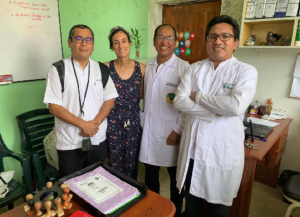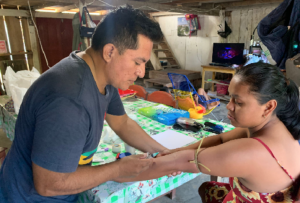UMH begins cooperation project that will improve diagnosing Chagas disease in rural populations of the Peruvian Amazon
 Chagas disease is a neglected tropical disease that is endemic within Latin America. It is caused by the parasite, Trypanosoma cruzi, and transmitted to humans by triatomine bugs. Poor rural areas of the Peruvian Amazon do not have good access to immunochromatographic diagnostic testing, which is useful for studying the seroprevalence and for optimizing diagnoses and clinical management of this disease.
Chagas disease is a neglected tropical disease that is endemic within Latin America. It is caused by the parasite, Trypanosoma cruzi, and transmitted to humans by triatomine bugs. Poor rural areas of the Peruvian Amazon do not have good access to immunochromatographic diagnostic testing, which is useful for studying the seroprevalence and for optimizing diagnoses and clinical management of this disease.
To combat this pathology, a transversal study between the UMH and the Amazon Jungle Civic Association (Iquito, Peru) aims to determine the risk factors within this area and to evaluate the usefulness of immunochromatography in Chagas disease screening.
This research effort is linked to international development cooperation and is part of the Sustainable Development Goals from the 2030 Agenda of the United Nations. More specifically, it is related to health and welfare and Target 3.3 from SDG 3: “By 2030, end the epidemics of AIDS, tuberculosis, malaria and neglected tropical diseases and combat hepatitis, water-borne diseases and other communicable diseases.”
 Following months of logistical preparations, actions begin in situ in May with Chagas screening in population centers wherein acute cases of this disease have been detected. Collaborators in this process include the Amazon Jungle Civic Association from Iquitos and the Department of Infectious Diseases and Tropical Medicine from the Loreto Regional Hospital, also from Iquitos.
Following months of logistical preparations, actions begin in situ in May with Chagas screening in population centers wherein acute cases of this disease have been detected. Collaborators in this process include the Amazon Jungle Civic Association from Iquitos and the Department of Infectious Diseases and Tropical Medicine from the Loreto Regional Hospital, also from Iquitos.
From the UMH, the project coordinator is José Manuel Ramos Rincón, a university associate professor from the Service of Internal Medicine at Alicante University General Hospital (HGUA). This project was selected in the call for international research projects from a 2020 agreement to fulfill the Sustainable Development Goals of the United Nations 2030 Agenda, which was announced by the UMH Vice Rectorate for International Relations and funded by the Generalitat Valenciana (Conv. GVA-UMH Solcif. 2020/0005).